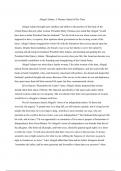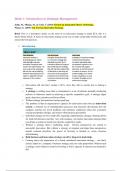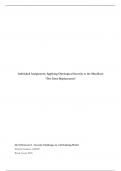Abigail Adams: A Woman Ahead of Her Time
Abigail Adams brought more intellect and ability to the position of first lady of the
United States than any other woman. President Harry Truman once noted that Abigail "would
have been a better President than her husband." Yet she lived in an era when women were not
supposed to have, or express, their opinions about government or the exciting events of the
times. Abigail Adams struggled her whole life with the limitations that society placed upon her
dreams. Despite these hardships, she found a way to use her talents to serve her nation by
assisting and advising her husband, President John Adams, and teaching and guiding her son,
President John Quincy Adams. Throughout her seventy-four-year life, this American heroine was
an invaluable contributor to the founding and strengthening of the United States.
Abigail Adams was more than a family woman. Like other women of the time, Abigail
lacked formal education; but her curiosity spurred her keen intelligence, and she read avidly the
books at hand. Insightful, witty, and intensely concerned with politics, she shared and shaped her
husband’s political thought and career. Because of his service to the nation in war and diplomacy,
they spent more than half their married life apart, but they communicated closely.
In her famous “Remember the Ladies” letter, Abigail Adams proposed that women
should claim their share of liberty. She objected specifically to the legal codes under which
married women could not own property. She was ahead of her time; later generations of women
would have to struggle to change such laws.
Not all Americans shared Abigail's vision of an independent nation. To those that
wavered, she argued, "A people may let a king fall, yet still remain a people: but if a king lets his
people slip from him, he is no longer a king. And this is most certainly our case, why not
proclaim to the world in decisive terms, your own independence?" Her husband John agreed with
his wife, and in June 1776 was appointed to a committee of five men to prepare a Declaration of
Independence from Great Britain. Yet Abigail's vision of independence was broader than that of
the delegates. She believed all people, and both sexes, should be granted equal rights. In a letter
to John she wrote, "I wish most sincerely that there was not a slave in the province. It always
seemed to me to fight ourselves for what we are robbing the Negroes of, who have as good a
right to freedom as we have." Later Abigail added that John and his fellow delegates should
"remember the ladies, and be more generous and favorable to them than you ancestors" when
Abigail Adams brought more intellect and ability to the position of first lady of the
United States than any other woman. President Harry Truman once noted that Abigail "would
have been a better President than her husband." Yet she lived in an era when women were not
supposed to have, or express, their opinions about government or the exciting events of the
times. Abigail Adams struggled her whole life with the limitations that society placed upon her
dreams. Despite these hardships, she found a way to use her talents to serve her nation by
assisting and advising her husband, President John Adams, and teaching and guiding her son,
President John Quincy Adams. Throughout her seventy-four-year life, this American heroine was
an invaluable contributor to the founding and strengthening of the United States.
Abigail Adams was more than a family woman. Like other women of the time, Abigail
lacked formal education; but her curiosity spurred her keen intelligence, and she read avidly the
books at hand. Insightful, witty, and intensely concerned with politics, she shared and shaped her
husband’s political thought and career. Because of his service to the nation in war and diplomacy,
they spent more than half their married life apart, but they communicated closely.
In her famous “Remember the Ladies” letter, Abigail Adams proposed that women
should claim their share of liberty. She objected specifically to the legal codes under which
married women could not own property. She was ahead of her time; later generations of women
would have to struggle to change such laws.
Not all Americans shared Abigail's vision of an independent nation. To those that
wavered, she argued, "A people may let a king fall, yet still remain a people: but if a king lets his
people slip from him, he is no longer a king. And this is most certainly our case, why not
proclaim to the world in decisive terms, your own independence?" Her husband John agreed with
his wife, and in June 1776 was appointed to a committee of five men to prepare a Declaration of
Independence from Great Britain. Yet Abigail's vision of independence was broader than that of
the delegates. She believed all people, and both sexes, should be granted equal rights. In a letter
to John she wrote, "I wish most sincerely that there was not a slave in the province. It always
seemed to me to fight ourselves for what we are robbing the Negroes of, who have as good a
right to freedom as we have." Later Abigail added that John and his fellow delegates should
"remember the ladies, and be more generous and favorable to them than you ancestors" when








